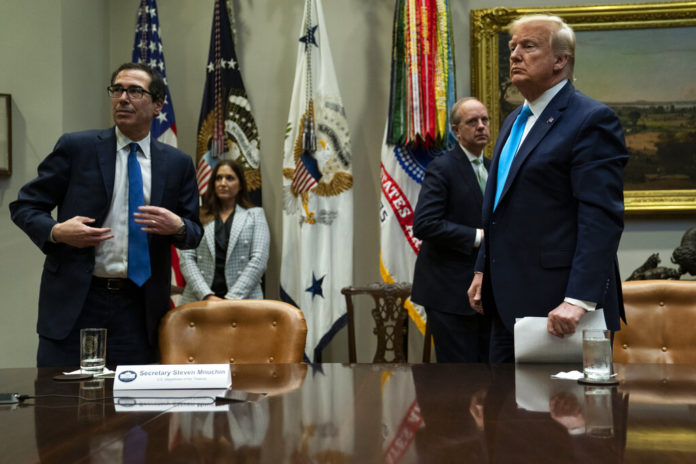
Congress is rushing headlong into a conflict over the next coronavirus aid package as the White House wants to pump $250 billion into a small business fund but opposes Democrats’ proposal to tack on billions for protective gear, food stamps and support to state and local governments.
An attempt for a Thursday vote in the Senate will pose a first test.
Despite the urgency to act, it’s a sudden breakdown over what all sides agree is the need for federal help as the pandemic crisis roars through communities large and small, and Washington prepares to go beyond the $2.2 trillion package approved just two weeks ago.
President Donald Trump urged passage of the small business funds “ASAP.”
Still, signs of potential progress emerged Wednesday in Washington’s effort to push cash out the door to suddenly out-of-work Americans and shuttered businesses.
The first tranche of $1,200 direct payments to Americans are set to begin next week, Treasury Secretary Steven Mnuchin told House Democrats during a conference call with the administration’s coronavirus task force.
Mnuchin also told the lawmakers that $98 billion in loans for small businesses has been approved under the program which the Trump administration wants Congress to bolster in Thursday’s vote, according to a person unauthorized to discuss the private call and granted anonymity.
But the White House opposes a proposal from House Speaker Nancy Pelosi and Senate Democratic Leader Chuck Schumer to add another $250 billion for other needs, according to a senior administration official unauthorized to discuss the situation and granted anonymity.
The White House prefers quick passage of infusion for small business payrolls, the official said.
That leads to the standoff because without bipartisan cooperation, no proposal is likely to be approved as Congress is all but shuttered amid the virus outbreak.
Pelosi said flatly the Republican-only proposal would face objections in the House.
“We have to spend what we need,” Pelosi told NPR, when asked if there were limits on federal aid.
Vice President Mike Pence convened private conference calls Wednesday with House Republicans and Democrats, in separate sessions with Mnuchin and the task force, to brief far-flung lawmakers on the response to the crisis.
Lawmakers heard from Dr. Anthony Fauci, Dr. Deborah Birx and other task force officials who outlined the difficult week in the U.S. with the rising number of coronavirus cases and deaths.
In the morning call with Republicans, Pence and the GOP leaders made a push for boosting the small business Paycheck Protection Program , according to a Republican aide unauthorized to discuss the call and granted anonymity.
The GOP leaders were in agreement about quickly approving more funding for the program, the aide said.
Part of the sweeping $2.2 trillion package that became law just two weeks ago, the $350 billion Paycheck Protection Program has been swamped as businesses rush to apply for up to $10 million in forgivable loans to keep paychecks flowing amid the stay-home shutdown.
In the call with Democrats, Mnuchin appeared to address head-on concerns that the small business aid was riddled with problems and not getting into the hands of those who need it most.
He told them that the loans have been approved so far by 3,600 lenders. It was not clear, however, how much of that money was now actually out the door.
But Democrats want assurances the small business funds go to minority-owned and other companies that may be under-banked without easy access to financial institutions.
“We cannot solidify the inequality to access to capital that exists in our economy at a time when we are address the coronavirus crisis,” Pelosi said.
It’s an issue that has been raised by Sen. Elizabeth Warren, D-Mass., and others who said millions of small business owners struggled to access the aid.
Lawmakers have raised concerns that the $1,200 direct payments to Americans could be delayed for months for those who do not have direct deposit through Treasury.
Senate Majority Leader Mitch McConnell’s decision to rush Trump’s request for small business aid to a vote without input from Democrats threatened a fragile alliance for bipartisan action.
“I hope none of my colleagues object to my request for these urgently-needed funds,” McConnell said on Twitter late Wednesday. “There is no reason why this bipartisan job-saving program should be held hostage for other priorities.”
The Democrats say they support the $250 billion in assistance to small businesses.
But they’re also calling for an additional $100 billion for hospitals and community health centers to provide testing supplies and protective equipment like masks and gowns. They are seeking another $150 billion for state and local governments to manage the coronavirus crisis
They also want a 15 percent increase to the maximum Supplemental Nutrition Assistance Program food stamp benefits.
Mnuchin also spoke by phone Wednesday to Schumer, who told the secretary about Democrats’ “very reasonable and needed” proposal, said Schumer’s spokesman, Justin Goodman.
Republicans swiftly countered that Democrats were blocking fast action on the small business aid. Many of the Democratic requests revisited behind-the-scenes battles from the round of talks that produce the CARES Act two weeks ago.
“Senate Democrats should drop their shameful threat to block this funding immediately,” said Sen. John Cornyn, R-Texas, a member of GOP leadership.
With Congress adjourned except for procedural pro-forma sessions, the House and Senate could deploy procedures that would allow a simple voice vote, without a roll call, or leaders could try to approve the package with unanimous consent.
Consent, though, seems unlikely, as Democrats push for add-ons and fiscal hawks criticize the cost. Rep. Thomas Massie, R-Ky., objected to the earlier package, forcing lawmakers to return to Washington for a vote.
Republished with the permission of the Associated Press.














